- Home
- Dusty Richards
Valley of Bones Page 10
Valley of Bones Read online
Page 10
“Find anything?”
“No. Just traffic. I don’t think they are through, but for now we can probably breathe easier.”
“Good.”
They went upstairs to their hot room.
“Chet, all my life I lived in Mexico and it was hot, but you spoiled me at Prescott so badly I may never want to go back home.”
“I’ve never known such a hot place, either. I will really be glad to be back home.”
“And you have no pending problems?”
He smiled at her. He really didn’t know of anything pressing enough to get him off his cowhide couch at home.
Chet, Liz, and Spencer took the first stage available. The rest would follow eight hours later. Slaughter’s horses would be stabled at the Tubac headquarters. That meant in three days the whole bunch would be home.
Chet teased Spencer about his wife. “Will Lucinda know you?”
“I don’t worry about that. She is the best thing that ever happened to me, and her children are the frosting. She is so happy at Prescott, but she said she’d go anywhere we need to go. It was so great to have her along building the telegraph line. I knew I really had a keeper during the hustle and bustle we had stretching that steel in the sky. It was so nice to have her every night rocking me to sleep. No place was bad and nothing amounted to a problem for her. I really am grateful I found her. She is learning to read and write and is excited about it.”
“I know,” Liz said leaning forward. “Lucinda is a fine lady. You did very well.”
“Thanks, Liz.”
The hot wind swept the coach, rocking and spurring up dust from sixteen hooves. Winding through the saguaro-studded desert they rocked toward Papago Wells, where the road split—one went west to Yuma and later California, the other north by northwest to Hayden’s Ferry and the capital to be called Phoenix, then, eventually up the Black Canyon route to Prescott.
The stretch to the Wells from Picaho Pass was short, but Chet was grateful to get out and flex while fresh horses were attached to the coach. Still more desert carpeted the area, with many Indian villages eking livings out of patches of irrigated ground. The Gila River was so low they dispensed with use of the ferry, and the animals must have enjoyed splashing through the shallow flow, then digging in to haul the stage back up onto the flat.
Their driver, Hailey McBrown, halted the team and told folks that they had a few minutes to stretch before they continued. He tied off the reins and scrambled down while Chet helped Liz down.
McBrown took one horse at a time, down the line, checking each harness.
Chet, curious, left Liz with Spencer and walked over to ask the man if anything was wrong.
“Ever have a feeling you need to do something like this?” McBrown shoved his stained felt hat back and shook his head.
“I have lots of those days.”
“They look fine. The workers keep the harness well-oiled and ready. I just hate a wreck. Let’s load. All is well.”
“What did he think was wrong?” she asked, taking her seat.
“He was concerned but found nothing.”
“Good.”
They rode on and finally made Hayden’s Ferry long after dark. The next stage left at noon the following day. He found them a room and wired ahead they’d be there the next night at midnight. They slept, and next morning were up to eat breakfast. It was windy and it swept some dead cottonwood leaves and dirt around the buildings and then northward on the wings of its hot breath.
He’d damn sure be pleased to be home a hundred miles north and way up in the sky. They went in the door of the stage station where the clerk smiled.
“Howdy, Mr. Byrnes. Good to see you and Mrs. again.”
“Me, too, we finally are going home.”
“If there ever is an opening up there, put my name in.” Then the clerk laughed.
Chet agreed to do it. They waited with Spencer. At last on board for the final leg of the journey they rocked on to the Salt River Ferry crossing and then headed north. It would be late night before getting home but they were bound in that direction. When they reached the altitude where ghostly forms of juniper brush shone in the moonlight and cooler air sought them, he smiled—home at last.
Chapter 9
Bare-footed, Chet went downstairs into the cool early morning air. The mourning doves were all he heard outside as the house waited for the rest of the ranch to awake. The vaqueros were already eating breakfast at the dining hall, and soon the children would be awake and would follow their mothers, who ate after the men left to check on cattle or whatever else needed their attention.
The pungent aroma of ponderosa pine mixed with some cooking fire smoke filled the cool house. Lisa had lamps on in the kitchen. Her husband, Miguel, and Spencer looked hollow-eyed as they raised their cups of coffee at him. “Welcome home.”
“Welcome to you. They ran a second stage for you guys?”
Spencer nodded. “Yes. I was grateful, too.”
Lisa swept by with a cup for Chet. “It’s good to have you all back here.”
“You have any plans for us today?” Spencer asked.
“Yes. You catching up on sleep. If we plan anything for tomorrow, we will send word.”
Spencer smiled. “I don’t want to miss out on anything.”
“We won’t count you out.”
He rose wearily. “I’ll go to sleep for two days then.”
“I will line up moving those cows and calves I bought from Slaughter up to the Oracle Ranch. That will give that place a good start. The Socorro cows will go to Toby at the Rustler’s Ranch. I should hear back from Joe Chavez by next week. Slaughter says he’s the most honest seller over there.”
When Spencer was gone, Miguel asked if everything in Tucson went the way he wanted.
“Yes, they’re in prison.”
“Fred told us men in Tucson tried to kill you?” Lisa asked.
“They never had a chance. Very stupid play in my book.”
“We are glad you and Liz are safe.”
“Lisa, so am I. And now we are back here for your great cooking. Anyone been around asking for us?”
“No.”
“Better.”
Miguel laughed. “You are worn out?”
“Tucson isn’t bad except in June, July, and August. I told Liz that.”
Lisa shook her head “You didn’t need to get up so early.”
“It’s habit.”
Raphael made his report on the ranch operation, and later Chet took a nap. There were stirrings about the big party coming up at the end of the week. The biggest things in store for them. All was good.
* * *
The next day Colonel Hardy Sullivan drove out to the ranch to discuss the upcoming auction of the Three V’s Ranch. Sullivan had two partners, Tom Shay and Bernie Wilkerson. Their firm handled most of the large ranch and pure-breed sales in the territory. Chet considered them a very high-class set of businessmen who knew how to handle purebred livestock auctions.
Sullivan, a tall man in his forties, took his hat off when Liz invited him in and took it from him. Then she went to the living room door to tell Chet that Sullivan was there.
The two men met and shook hands in the center of the living room. Chet showed him to the leather chairs Liz had bought especially for such meetings.
“I guess you are staying up here what with that large auction date growing closer,” Chet said when they took seats.
“Yes. That is typically how we handle setting them up. I wanted to talk with you and hope you would share any intentions you have about the ranch’s sale, since you are the largest ranch owner in the territory that I know.”
“Hardy, if I may call you that, I have been in Tucson helping prosecute some white slavers who kidnapped two young farm girls to sell in Mexico for a horrible life of prostitution. That is settled, and they won’t be out of jail for years, so all I know is that Mitchel Van Roy, who died a year ago, left his widow Alice that ranch and they had no c
lose heirs.”
“Exactly. I fear her husband let his laborers only do small details, so they did not know how to run that large ranch. He ran the ranch until he died.”
“My brother-in-law, Hampt Tate, who married my brother’s widow May, told me all about that when we attended Mitch’s funeral. Hampt knew Mitchel well. They were almost neighbors. As for my plans regarding the sale of the ranch, as of today I have no plans to be involved.”
“I am disappointed to hear that, Chet. To buy that ranch will require a person with the finances who understands ranching in this region. That ranch, in the wrong hands, or under weak management, might end up being a big problem for your operations. I am not here to force you to participate, but rather I am here to talk to you face-to-face and warn you about the possibility of this spilling over and harming your operations.”
“Hardy, my men are some of the greatest ranch managers in the United States. If you think the Three V’s might affect my holdings, I will gather and have them inspect the ranch’s total operation. They, then, will tell me what they think I should do about the ranch. Thank you for your concern.”
“Anything that they need, me or my partners will be glad to show them. Nothing is hidden.”
“Thank you. I know you’re seriously selling almost a kingdom for a poor lady.”
* * *
Chet sent Fred down to the Verde Ranch to get Tom and Victor and to explain his needs from them. Then he appointed Spencer to go get Hampt.
Chet said, “You two can inspect this ranch together after we have a meeting here. Miguel, you go get Toby. Maybe he needs to bring Talley here while he helps you with the inspection.
“I want every damn weakness and strength in that ranch and what you’d do if you ran it or if you had the money to buy it—or not. Simply tell him we need him for a few days on a secret project. You and Toby can appraise the ranch like the others.”
Liz was laughing when they rode off in all directions, like something was on fire. “What about the party we planned?”
“Liz, I completely forgot about those plans. After the conference at the house we can make a decision about the party, but I am certain we can have it. This ranch is not a life-or-death situation, but we do need to know what we should do. I am sorry. I am counting on these leaders of mine to give me the advice I need to know to decide about whether we need the ranch or not.”
“Chet Byrnes, come here. I love you.” She hugged him. “Have you ever thought you have enough?”
“No. I have two sons who, someday, might want to ranch.”
“Or play piano and sing?”
“They don’t look like they’re headed that way, but if they don’t want to, they won’t have to ranch.” He rocked her in his arms. “This territory is fast becoming a very wanted place. If there were rail tracks up where the stage line is running that ranch would be worth four times the price it will bring in three weeks.”
“You’re certain of that? The train is coming, we know that. It is just a matter of when. If the value of that ranch will increase like you say, then you need to buy it.”
He kissed her forehead. “I was thinking that way this morning. You and I need to look at the expenditures we will have to make on it first.”
“Who would run it?” She hugged him possessively again.
“It depends on what it needs.”
“I understand.”
“You know what? We are having the party. ”
“Hey, you decided. We don’t need the conference first? The party is on?”
“Damn right.”
* * *
Fred, Tom, and Victor, another ranch worker, arrived at the Valley ranch first around midday. Spencer and Hampt were seconds behind them. Miguel and Toby would take more time. Lisa served coffee and rolls in the living room and everyone bragged on them.
While they drank and ate, Chet filled them in. “Miguel has gone for Toby and I sent a boy for Jesus, so he will be here shortly. The auctioneer for the Three V’s Ranch, Colonel Sullivan, was here earlier. He’d like us to be bidders. I called you all in to go look and tear it apart. What all it needs. What we’d have to spend money on. Who would be the best man to run the place? I know we are all partners in these ranches, and I rely on you men a lot,” Chet finished.
“While we were in Tucson, a cattle buyer named John Slaughter furnished us with some great horses to use down there. He also sold us three hundred and fifty mother cows and calves—all half British breeds or greater—as a very good deal because he needed the money immediately. He is a very nice guy and a sharp businessman. We will stock the Oracle Ranch with those cattle. That will be under way shortly.”
“Fred told us about him on the way up here. That saves you a big headache and a year better start on cattle to sell,” Tom said.
“Exactly. We still have to stock Rustler’s Ranch, but John also gave me the name of a seller over at Socorro who sounds like the person who needs to get that ranch stocked, too.”
“Chet,” Hampt spoke up next. “Mitchel Van Roy’s ranch has lots of old cows he should have culled. I knew him well before he died and we visited a lot. He also has some ancient mossy-horned cows he wouldn’t part with.”
“Tell us about his hay operation, Hampt?”
“He hated having to grow, mow, or do anything like that, so his haying operation could have been better, but there are some artesian wells up there.”
“Then I will count on you figuring what we have to do, since you are the hay expert.”
Everyone around the living room nodded in agreement about that.
Hampt shook his head. “A few years ago, I was unemployed when Chet came to Arizona, and if anyone’d told me I would be in charge of anything, I’d have laughed all day. But, boys, things have changed in all our lives, and I’ll be the hay expert, funny as it even sounds today in my ears.”
Everyone laughed and cheered him on.
“I have never been impressed with the men Mitch hired,” Tom said.
“They work cheap enough,” Victor said.
“That’s it. Who else would have them even at that low a price?” Tom shook his head.
“I need to know if the ranch can hold the number of cattle he’s currently running.”
“Yes,” Hampt said. “We need to look at that hard. That south half of my ranch is still recovering from being overgrazed before we bought it. And if we hadn’t shipped two hundred head of mother cows to Lucy’s bunch, I’d be out of grass.”
“When do you want to start looking?” Chet asked
“Since we’re here,” Tom said. “Let’s ride over there today and tomorrow. Go home tomorrow night and come back to the party here Saturday. Monday onward, we can spend whatever time we need to wind it up.”
Jesus arrived on a fast horse. Chet met him at the door going out. “You and I can talk on the way. We are going to start looking at the Three V’s as a possible addition to our operation.”
“I’d seen the auction posters and wondered what you’d do about it.” Jesus wore a knowing grin.
“I have all these thinkers and doers on my payroll, so we will all look at it and collectively decide if I need it or not and what we need to do to make it better.”
Jesus agreed with the plan.
Chet kissed Liz good-bye and rode, with the others, to the Three V’s.
Like lots of ranchers, Mitch never strung barbed wire. He hated it. His ground was enclosed by lodgepole-like fences. It required a lot of expense and time to maintain. For Chet’s part, barbed wire was the way to keep cattle out or in whatever you needed to do with them.
The house was large, rambling, and in neglect but nothing that a few good men couldn’t fix and paint to bring it back. Alice was a sweet old lady with arthritis-deformed hands. Chet could see she really had aged since Mitch died. They had hot tea and she asked him about his lovely wife. As they were leaving, she thanked him for coming to see her.
After his visit, he and Jesus went and studied the ir
rigation of some of the alfalfa fields. His first look told him they were late with the application of water. Several small leaves on the plants had already turned brown from lack of water, and he called that a “you don’t give a damn” care. He found three of the workers, and made them work the water. Once the water was going down the field, it spooked bugs out of the plants and noisy killdeer were there to gobble them down. The ranch employees went and napped, on the ground in the shade, until a change was needed.
Had they ever heard of doing two things at a time? Obviously not.
Chet and Jesus found more of the small fields down the line needed water, too.
“Isn’t it artesian?” Jesus asked riding along.
“I guess so. These irrigated flats are small compared to what we do at Verde. It’s like he developed one, then added another and another.”
Jesus chuckled. “Like he did one, then another, and said, ‘Oh, hell, I need more.’”
Chet twisted in the saddle and looked back. “Exactly.”
“Why are there three men irrigating?”
“Good question. I bet the others noticed that, too.”
“Where are his corrals?”
“I guess farther back.”
“He doesn’t have many haystacks. Either old or new.”
“Victor would be concerned if he was here.” Chet reined up the roan horse.
Jesus did the same. “I know I am. It’s midsummer. They don’t have enough hay for one snowstorm, let alone more.”
“I bet you have more hay at your new farm than this?”
“I sure do. My neighbor has the equipment but his mower was worn out. I bought a new one from your buddy Ben and we do it on the shares. I have lots more hay stacked on my small ranch than this place has.”
“I’ve seen some in passing your place. Nice. Let’s go find the corrals. I think the others are looking at the cattle and the stock water.”
Half an hour later, they almost laughed when they arrived at the site.
“This is a horseback roundup site?” Chet said, amused. The fallen-down pens would be of little or no value, and that meant they had to hold the stock in place with riders until they could build new.
“This place will need more than three men—” Jesus was laughing hard.

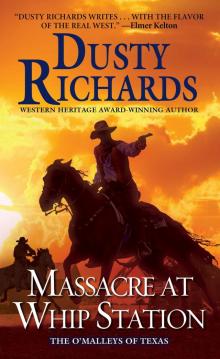 Massacre at Whip Station
Massacre at Whip Station Blue Roan Colt
Blue Roan Colt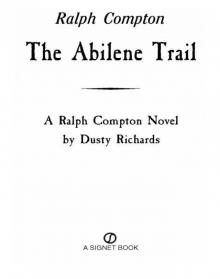 The Abilene Trail
The Abilene Trail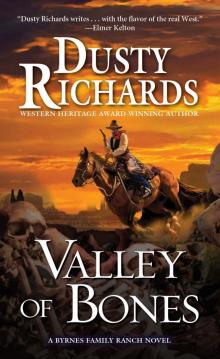 Valley of Bones
Valley of Bones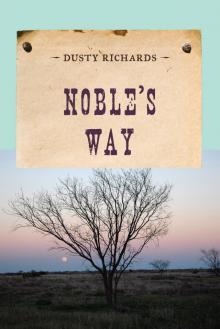 Noble's Way
Noble's Way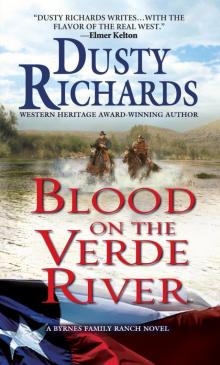 Blood on the Verde River
Blood on the Verde River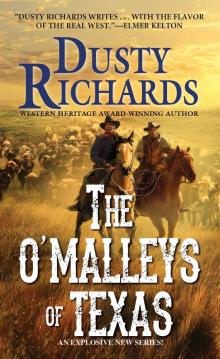 The O'Malleys of Texas
The O'Malleys of Texas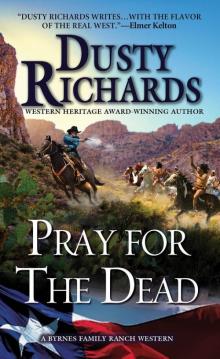 Pray for the Dead
Pray for the Dead Arizona Territory
Arizona Territory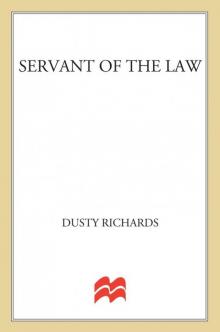 Servant of the Law
Servant of the Law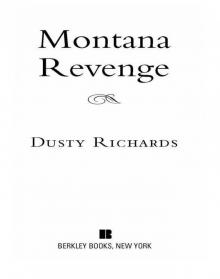 Montana Revenge
Montana Revenge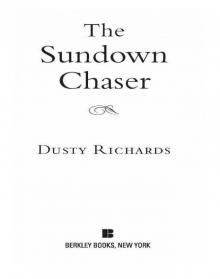 The Sundown Chaser
The Sundown Chaser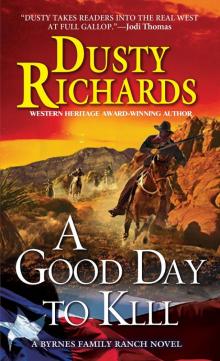 A Good Day To Kill
A Good Day To Kill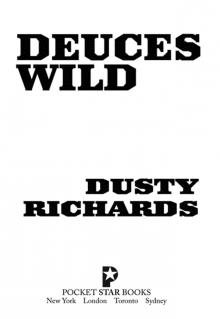 Deuces Wild
Deuces Wild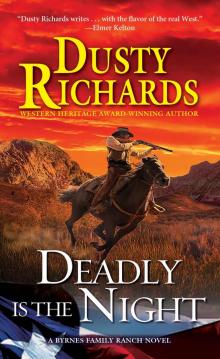 Deadly Is the Night
Deadly Is the Night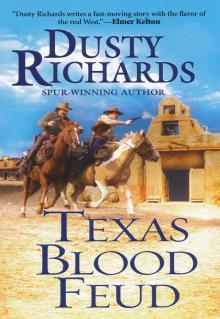 Texas Blood Feud
Texas Blood Feud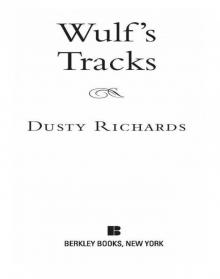 Wulf's Tracks
Wulf's Tracks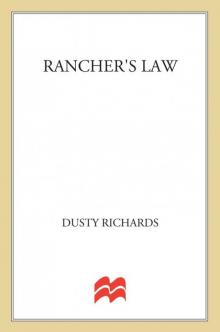 Rancher's Law
Rancher's Law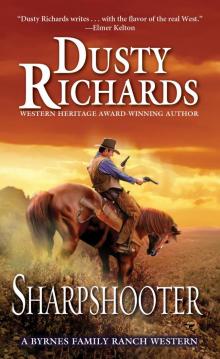 Sharpshooter
Sharpshooter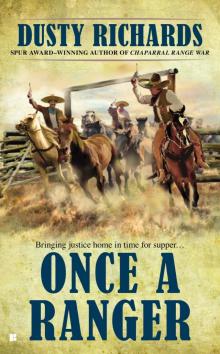 Once a Ranger
Once a Ranger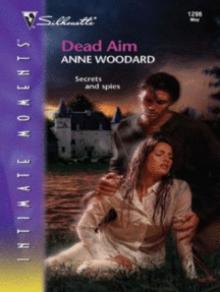 Dead Aim
Dead Aim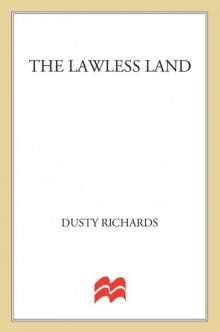 Lawless Land
Lawless Land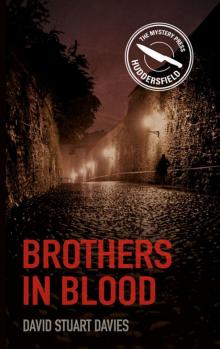 Brothers in Blood
Brothers in Blood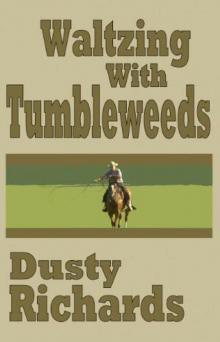 Waltzing With Tumbleweeds
Waltzing With Tumbleweeds